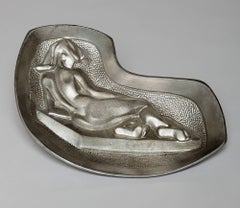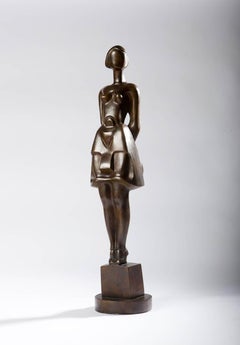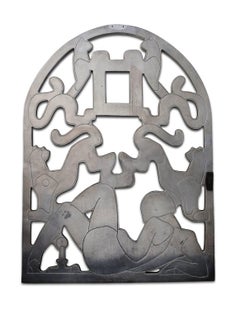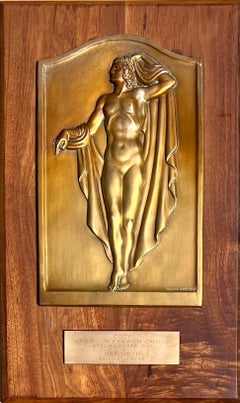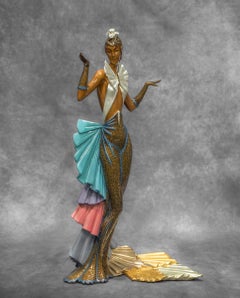Dudley Vaill Talcott Art
American, 1899-1986
Dudley Vaill Talcott was born in Hartford, Connecticut. He studied for one year at Yale University's Art School before moving to Paris in 1920 when he took instruction at the Academié de la Grande Chaumière in Paris, France.
to
5
3
1
1
Overall Height
to
Overall Width
to
3
1
1
2
2
2
2
1
1
1
1
1
5
1
1
1
1
5
6,952
3,301
2,514
1,213
4
2
1
1
Artist: Dudley Vaill Talcott
Reclining Boy
By Dudley Vaill Talcott
Located in Boston, MA
Initialed and dated: "DVT 61". From the estate of the artist. In fine condition.
Category
Mid-20th Century American Modern Dudley Vaill Talcott Art
Materials
Bronze
Free Form Abstract Sculpture [II]
By Dudley Vaill Talcott
Located in Boston, MA
Dudley Vaill Talcott, American (1899-1986), Free Form Abstract Sculpture [II], circa 1984. From the estate of the artist. In fine condition.
Exhibited: Aetna Life Insurance Galler...
Category
1980s Abstract Dudley Vaill Talcott Art
Materials
Resin
Ashtray with Woman on Base
By Dudley Vaill Talcott
Located in Boston, MA
Dudley Vaill Talcott, American (1899-1986), circa 1965. With signature stamp underside: "DVT". From the estate of the artist. In fine condition.
Exhibited: Aetna Life Insurance...
Category
1960s American Modern Dudley Vaill Talcott Art
Materials
Aluminum
Child's Restaurant Waitress
By Dudley Vaill Talcott
Located in Boston, MA
Dudley Vaill Talcott, American (1899-1986), Child's Restaurant Waitress, circa 1929. Number 1 of 12, cast 2011. Stamped with the artists' initials; DVT and dated on base.
Other ve...
Category
1920s Modern Dudley Vaill Talcott Art
Materials
Bronze
The Gate
By Dudley Vaill Talcott
Located in Boston, MA
Dudley Vaill Talcott (American, 1899-1986), The Gate, 1930s. From the estate of the artist. In fine condition. This large aluminum gate is decorated with the...
Category
1930s Art Deco Dudley Vaill Talcott Art
Materials
Aluminum
Related Items
1961 Coty Award Plaque Kenneth Hairdresser Jacqueline Onassis Bronze Fashion
Located in New York, NY
1961 Coty Award Plaque Kenneth Hairdresser Jacqueline Onassis Bronze Fashion
Bronze on wood. The wood plaque measures 12 3/4" by 20 3/4 inches. The bronze plaque itself is 13 3/4 x 8 3/4 inches and the the bronze inscription, which reads "COTY, American Fashion Critics Special Award 1961 to KENNETH of LILY DACHE...
Category
1960s American Modern Dudley Vaill Talcott Art
Materials
Bronze
Copacabana
By Erté
Located in Greenwich, CT
Copacabana presents Erté's vision of fantasy, splendor, and femininity in a statuesque model wearing a cabaret costume. The gown is noted for its luxuriant richness and design. Softe...
Category
20th Century Art Deco Dudley Vaill Talcott Art
Materials
Bronze
2 Sculptures: "The Power" & "The Glory" WPA Depression WWII era mid 20th century
By Agnes Yarnall
Located in New York, NY
2 Sculptures: "The Power" & "The Glory" WPA Depression WWII era mid 20th century by Agnes Yarnall circa 1940s.
Sculptor, painter, poet and artistic historian, Agnes Yarnall has, since the age of six been breathing life into her art.
Renowned as a sculptor, whose commissioned portrayals of contemporary celebrities are prized. She has sculpted Judith Anderson, Edna St. Vincent Millay, Carl Sandburg...
Category
1940s American Modern Dudley Vaill Talcott Art
Materials
Plaster
Industrial Machine Age American Scene WPA Mid 20th Century 1939 SF World's Fair
Located in New York, NY
Industrial Machine Age American Scene WPA Mid 20th Century 1939 SF World's Fair
HAIG PATIGIAN (American/Armenian, 1876-1950)
Aeronautics Pediments
Two Plaster Casts, c. 1930s
each 13.25 x 14.75 x 6 inches
It's possible these moquettes were created for the 1939 World's Fair, the Golden Gate International Exhibition in San Francisco.
Provenance: Private Collection of Lois M. Wright, Author of "A Catalogue of the Life Works of Haig Patigian, San Francisco Sculptor, 1876-1950),” 1967
Loan to Oakland Museum of California (Oakland, CA)
BIO
Haig Patigian is noted for his classical works, which are especially numerous in public venues in San Francisco, California. Patigian was born in Van, Armenia, which at that time was under Turkish rule. Haig was the son of Avedis and Marine Patigian, both teachers in the American Mission School there. He and his older brother showed an aptitude for art early on and were encouraged by their parents. Their father himself had taken up the new hobby of photography. The 1880s were harsh times, however, for many Armenians under an oppressive rule by the Turkish government. Many people were fleeing to the safety of the United States. Suspicious Turkish authorities accused his father of photographing city structures for the Russian government, and in 1888 he fled for his life to America.
Haigs father made his way to Fresno, California, and began life anew as a ranch hand. Within two years he sent for his wife, as well as Haig, his three sisters and brother, and in 1891 the Patigians made the journey from Armenia. Haigs father, an industrious man, worked on various farms, and eventually bought his own ranch and vineyard. It was among fertile farmland of Fresno that Haig grew up.
Young Haigs education consisted of teachings by his parents and by intermittent attendance in public schools. Although he had dreams of becoming an artist, he did not have the opportunity for formal study of art, and began working long days in the vineyards around Fresno.
At age seventeen, Haig made a step towards his dreams and apprenticed himself to learn the trade of sign painting. In his spare time he nurtured his interest in art by painting nature and life scenes with watercolors and oil paints. When his sign-painting mentor left Fresno, Haig opened his own shop and made a name for himself in the town. San Francisco, in the meantime, had been attracting artists since the Gold Rush and had become a thriving art center. Within a few years, Haig had put aside several hundred dollars to move to San Francisco, joining his brother who was already working there as an illustrator.
In 1899, when he was twenty-three, Haig had saved enough money to enroll at the Mark Hopkins Art Institute in San Francisco. Like many aspiring artists of his time, Patigian supported himself by working as a staff artist in the art department of a local newspaper, and in the winter of 1900, nearing his 24th birthday, Haig began work for the San Francisco Bulletin, producing cartoons, black and white illustrations, as well as watercolors.
In 1902 tragedy struck Haig and his family. His 29-year-old brother died of pneumonia, and then his frail mother died a short time later. Five months more saw his youngest sister, just out of high school, die too. Saddened and depressed, Haig moved out of the studio he had shared with his brother, and into a dilapidated studio in a poor section of town. During this time of sadness, Haig fed a growing interest in sculpture.
In 1904 Haig created what he later called his "first finished piece in sculpture". The work, called "The Unquiet Soul", depicted a man thrown back against a rock while waves lash at his feet. The body was tense and twisted, with one hand, in Haig's own words, "searchingly leaning and clutching the rock, while the other masks his troubled head".
The Press Club of San Francisco, which Haig had joined in 1901, put "The Unquiet Soul" on exhibition and local headlines proclaimed "Local Newspaper Artist Embraces Sculptor's Art", and "First Work Predicts Brilliant Future". With the support of friends and community acclaim, the young illustrator left his newspaper job and became a professional sculptor.
The path of his new career was not easy though. Haig had never made much money working for the newspaper and his father needed help with growing debt from funeral expenses and business problems. From time to time Haig sold some artwork, but also occasionally borrowed from friends to pay the rent. He was the classic 'starving artist'.
In the spring of 1905 a white-bearded 81-year-old stranger knocked on Haig's door. It was George Zehndner, from Arcata, California. Zehndner had been born in Bavaria, Germany in 1824, the son of a farmer. In 1849 he had come to America looking for prosperity, settling in Indiana, where he worked on a farm and learned English. He found his way to the West Coast in 1852. Penniless, he worked in various jobs from San Francisco to Sacramento, then found some luck working in the gold fields of Weaverville in Trinity County, and eventually moving to a farm on 188 acres near Arcata. In his 77th year in May of 1901, Zahndner had taken a trip to San Jose, where he stood in a crowd to see a man he thought much of, President William McKinley. McKinley was popular as 'the first modern president' partially because he realized going out to meet the common person increased his support. In September of that year, however, an anarchist assassinated the president while he stood in a receiving line at the Pan-American Exhibition in Buffalo, New York. Soon after, the city of San Jose erected a statue of the slain president in St. James Park. Zehndner took a second trip to San Jose where he visited the McKinley monument. Touched, Zehndner decided that, no matter the cost, his town of Arcata too would memorialize McKinley.
George Zehndner had read about Haig in a newspaper article and asked if Patigian would create a heroic statue of the late President McKinley for Arcata. When asked how much it would cost, Haig responded, despite his borderline poverty, with the fabulous sum of $15,000. Zehndner agreed. The President was to be portrayed standing, wearing an overcoat, with his feet planted squarely on the ground. In the finished statue, one hand is held out before him in a typical posture of speaking, with the other hand holding the speech as his side. The 9-foot statue...
Category
1930s American Modern Dudley Vaill Talcott Art
Materials
Plaster
"Untitled" bronze sculpture of seated female figure by artist Felipe Castañeda
By Felipe Castañeda
Located in Boca Raton, FL
"Untitled" bronze sculpture of a female nude by artist Felipe Castañeda. Inscribed F. Castañeda 1984 P/A on base.
Category
1980s Modern Dudley Vaill Talcott Art
Materials
Bronze
Mid Century Bronze Sculpture -- Poseidon's Fury
By Daniel Albert Harris
Located in Soquel, CA
A rare sculpture by Daniel Albert Harris (aka: Zev- the Wolf) (1914-1986) c. 1968 A substantial and stunning bronze sculpture of Poseidon (or Neptune) riding on a shell driven by hor...
Category
1960s American Modern Dudley Vaill Talcott Art
Materials
Bronze
"Pioneer Family" WPA American Modernism Plaster Maquette Realism 20th Century
By William Zorach
Located in New York, NY
"Pioneer Family," 23 1/2 x 16 1/4 x 10 3/4 inPlaster. c. 1927. Unsigned. Realism
The Smithsonian has a cast of this sculpture in its collection. Pictured on the cover of “The Sculpt...
Category
1920s American Modern Dudley Vaill Talcott Art
Materials
Plaster
sabine
By Patrick Brun
Located in Pasadena, CA
Patrick BRUN was born in Paris in 1941. After obtaining his Engineering degree, he began his professional life as a teacher in mathematics and physics. After this period, he started ...
Category
21st Century and Contemporary Modern Dudley Vaill Talcott Art
Materials
Bronze
Couple
By Agustín Cárdenas
Located in New Orleans, LA
Infused with a crisp modernity and subtle sensuality, this bronze sculpture by Cuban-born artist Agustin Cárdenas is an exceptional example of late-2...
Category
20th Century Modern Dudley Vaill Talcott Art
Materials
Marble, Bronze
Harmony, 20th century bronze & green marble base, nude man and woman with lyre
By Max Kalish
Located in Beachwood, OH
Max Kalish (American, 1891-1945)
Harmony, c. 1930
Bronze with green marble base
Incised signature on right upper side of base
14 x 9 x 5 inches, excluding base
17 x 10 x 8 inches, including base
Born in Poland March 1, 1891, figurative sculptor Max Kalish came to the United States in 1894, his family settling in Ohio. A talented youth, Kalish enrolled at the Cleveland Institute of Art as a fifteen-year-old, receiving a first-place award for modeling the figure during studies with Herman Matzen. Kalish went to New York City following graduation, studying with Isidore Konti...
Category
1930s American Modern Dudley Vaill Talcott Art
Materials
Marble, Bronze
Emperor's Heads
By Henry Moore
Located in Palm Desert, CA
A sculpture by Henry Moore. "Emperor's Heads" is a figurative sculpture, bronze with a brown patina by modern British artist Henry Moore. It is signed on the base, "Moore 2/7" and is...
Category
Mid-20th Century Modern Dudley Vaill Talcott Art
Materials
Bronze
Bronze Abstract Space Age Book Sculpture LA California Modernist Charna Rickey
By Charna Rickey
Located in Surfside, FL
Charna Rickey 1923 - 2000 Mexican-American Jewish Woman artist.
Signed Bronze House of Books, Architecture Bronze sculpture, signed Charna Rickey and on the front "House of the book." It depicts an open Torah. Original patina.
Approx. dimensions: 7 in. H x 9 in. W x 8.5 in. D. Weight: 13.1 lbs.
Modernist Judaica Sculpture
Born Charna Barsky (Charna Ysabel or Isabel Rickey Barsky) in Chihuahua, Mexico, the future artist lived in Hermosillo and immigrated to Los Angeles when she was 11. She was educated at UCLA and Cal State L.A., she married furniture retailer David Rickey and explored art while raising their three daughters. Moving through phases in terra cotta, bronze, marble and aluminum, she found success later in life. Rickey became one of the original art teachers at Everywoman's Village, a pioneering learning center for women established by three housewives in Van Nuys in 1963. She also taught sculpture at the University of Judaism from 1965 to 1981.
As Rickey became more successful, her sculptures were exhibited in such venues as Artspace Gallery in Woodland Hills and the Courtyard of Century Plaza Towers as part of a 1989 Sculpture Walk produced by the Los Angeles Arts Council. Her sculptures have also found their way into the private collections of such celebrities as Sharon Stone.
Another of Rickey's international creations originally stood at Santa Monica College. In 1985, her 12-foot-high musical sculpture shaped like the Hebrew letter "shin" was moved to the Rubin Academy of Music and Dance at Hebrew University in Jerusalem. The free standing architectural Judaic aluminum work has strings that vibrate in the wind to produce sounds. Rickey also created art pieces for the city of Brea. They commissioned some amazing art pieces by Laddie John Dill, Walter Dusenbery, Woods Davy, Rod Kagan, Pol Bury, Niki de Saint Phalle, Magdalena Abakanowicz, Larry Bell, John Okulick...
Category
20th Century American Modern Dudley Vaill Talcott Art
Materials
Marble, Bronze
Dudley Vaill Talcott art for sale on 1stDibs.
Find a wide variety of authentic Dudley Vaill Talcott art available for sale on 1stDibs. You can also browse by medium to find art by Dudley Vaill Talcott in metal, bronze, organic material and more. Much of the original work by this artist or collective was created during the 20th century and is mostly associated with the modern style. Not every interior allows for large Dudley Vaill Talcott art, so small editions measuring 5 inches across are available. Customers who are interested in this artist might also find the work of Stanley Bleifeld, Suzan Etkin, and Brad Rude. Dudley Vaill Talcott art prices can differ depending upon medium, time period and other attributes. On 1stDibs, the price for these items starts at $2,750 and tops out at $125,000, while the average work can sell for $5,500.
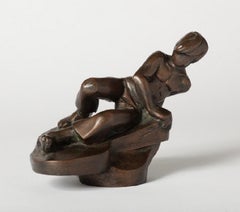
![krista dudley music Free Form Abstract Sculpture [II]](https://a.1stdibscdn.com/archivesE/upload/a_3973/1463162353236/01_26_135bR_master.jpg?width=240)
